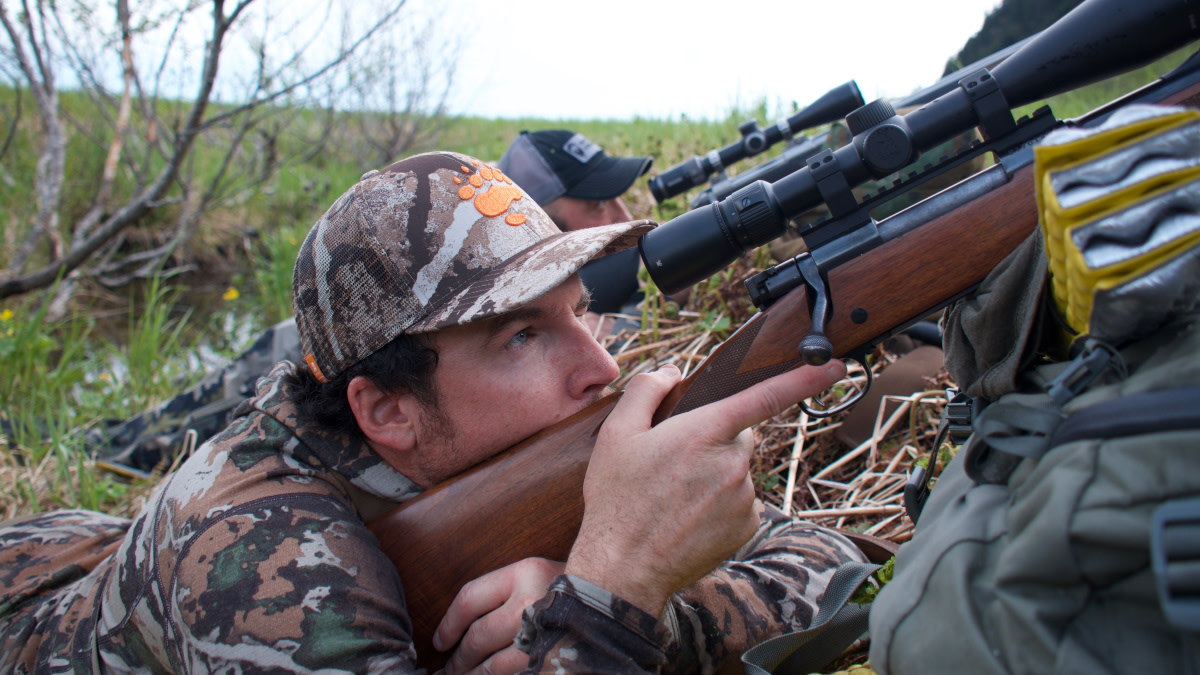
Anyone who hunts has experienced the heartache of an errant shot. You’ll beat yourself up, think you aren’t worthy of having a tag, and wonder if you should take up golfing—all because of one miss.
From my recent trip to Alaska to hunt black bears, all I brought home was regret, self-loathing and sadness. I thought I did everything right, but two shots that I had made hundreds of times before went sailing beyond my targets on separate occasions.
At MeatEater, many of us are still haunted by misses from hunts past. Here’s a few of those stories.
Janis Putelis
I missed a nice 6-point bull in Montana about 10 years ago. I traveled from Colorado and was hunting on a $600 non-resident tag, so the miss hurt that much more. It was probably 4 or 5 days into the hunt and we had limited action. The night before, instead of going to an area, blind calling, and hoping for action, I decided to go to a high point and glass. It paid off and I found four cows with a 6-point on a distant knob.
I left early the next morning, hiking an hour in the dark to be at the knob by first light. The elk were right where I had left them and the setup couldn’t have been better: the cows we’re feeding ahead of the bull, down the hill and I was coming at him from a right angle, with a light wind in my face.
He was feeding on an open slope with dotted sagebrush, not giving me much for cover, but the roll of the knob allowed me to get to 30 yards before I could even see his vitals. I was hunting with my recurve bow, so I needed 10 more. Every time he put his head down to feed, his eye would disappear behind a tuft of bunch grass or a sagebrush bush; and every time he lifted his head his attention was directed to the cows below him. I crab-crawled to within 20 yards with ease. We were both out in the wide open; nothing separated the tip of my arrow and his vitals. I got into shooting position, took a deep breath, found my spot—I thought—drew my bow, and let one fly into outer space.
When I recount the story over beers, I shot “just over his back.” It might have been 2 feet over. I don’t really know. But I do know that the sound that arrow made as it cut through twenty yards of air before the bull and then another forty or so yards beyond the bull was as empty a sound as I’ve ever heard. And the same emptiness that embodied that arrow’s flight immediately found itself in my guts.
I had not up to that moment, nor have I since, felt my stomach drop out like that. A combination of nausea, disbelief and regret flooded my brain, so much so that that I could not stand. I was brought to my knees. I squeaked out a whimpering bugle as I watched the bull and his cows crest the next ridge.
Absolutely no other thought could enter my head during that longest of long walks back to camp. Although I never cried, I did stop to punch a few trees and scream in disappointment at myself. Crying would not have been beneath me. I can’t remember if I hunted that evening or not. I did, however, drown my sorrows in a few glasses of whiskey that night and was hunting again the next day. But I wasn’t the same for the duration of the trip. My heart wasn’t into it anymore. We got into more bulls, but every encounter seemed to go wrong.
Getting over that missed shot simply took time. I put my bow down for a few weeks after the hunt, and when I picked it up again, I was happy to just be shooting. The empty feeling had now faded to a simple reminder to shoot more often. I knew next time I would slow down and do a better job of picking my spot. It simply takes time.
Ryan Callaghan
I missed the largest mule deer of my life at 90 yards. No, the wind was not ripping and the snow was not blinding; The deer was just too big. The whiffed shot came after several deerless days of hiking with camp on my back through shin-deep snow. The only thing that had kept me in the area were the frustratingly fresh deer tracks and lack of human tracks.
In a seemingly insignificant drainage that I’d walked through in the days prior, I found just a single mule deer doe. The doe was moving erratically due to the fact that she had not one, but six bucks hot on her tail. Sadly, the bucks were not of interest at that point in the trip. The hunt had been long and tiring, so the thought of hauling out one of those average bucks wasn’t all that appealing.
Yet, in trying to force myself to be a good and vigilant hunter, I maneuvered slowly into a position that would allow for a better shot if something bigger presented itself. What the hell were the chances of that?
For the last three days there had not been a deer on the mountain, and now there were six bucks in front of me. Any feelings of detachment from the deer and the mountain went away when I saw buck Number Seven. He was slipping away from the crowd, moving left with the doe as the other six bucks moved right. He was right in front of me.
He was heavy, he was wide and he was sly. He also lives today.
Mark Kenyon
The 2013 hunting season had been brutal up to this point, with nearly three months of hunts chasing a mature buck and nothing to show for it. So, with a snowstorm in the forecast for southern Ohio, I burned five hours south for what I thought might be my last best chance to fill a tag. With blizzard-like conditions already present as I settled in on the ground with my muzzleloader, I spotted two dark shapes working across the opposite wood line. When I pulled up my scope, I saw a big Ohio 8-pointer that I’d encountered multiple times over the past couple months.
I couldn’t get a range on him but guessed 125 yards, rested my muzzleloader against the side of an ice-coated tree, found him in the scope and squeezed the trigger. The buck looked up, bounced about 10 yards away, and then stopped again. Had I missed?
I rushed to reload another sabot, then saw that miraculously he was still standing there when I finished. I lined up on him again, steadied my ragged nerves, and squeezed. He looked up, bounded off another ten yards and then stood still yet again! I’d missed twice in a row and before I could get the third round loaded, he disappeared into the woods. At about that same time I felt something drip down my nose. I wiped my face, looked at my hand, and saw snow, ice and blood. Not only had I missed my best chance at a mature buck that year—twice—but I’d also scoped myself badly.
I still have the scar today. After investigating the site of the shot and following the buck’s tracks a long distance in the snow, I found no blood other than my own.
In the aftermath I experienced a boatload of self-loathing. All of those months of work had come down to this one chance and I’d blown it. I allowed myself to indulge in the pity party for about 24 hours, then decided to keep after it. The only thing worse than this feeling, I believed, was the regret I’d feel months down the line if I threw in the towel and gave up. To regain some confidence, upon returning home to Michigan, I double checked my zero and put enough rounds in the bullseye to feel good about my chances next time around.
As luck would have it, a couple weeks later in Michigan I had another chance at a mature buck with my muzzleloader, and this time capitalized with a perfect behind-the-shoulder shot. And two years later that same Ohio 8-pointer I missed twice walked back into my life, now as a 5.5-year-old ,160-inch buck. I redeemed myself with a 20-yard heart shot with my bow.
The greatest lesson I learned from this whole experience was that you can’t control the past, only how you react to it. After the misses occurred, it was tempting to dwell on that failure, but I knew I had to get my mind right and keep on keeping on. The results, at least in this case, ended up bearing that out.






